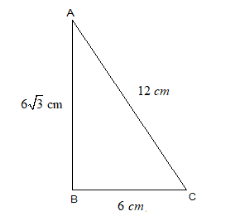Question
Question: In \[\Delta ABC\], \[\text{AB}=6\sqrt{3}\text{ cm}\], \[\text{AC}=12\text{ }cm\] and \[\text{BC}=6\t...
In ΔABC, AB=63 cm, AC=12 cm and BC=6 cm, then find the measure of ∠B.
Solution
To find the measure of the angle by using the sides of the triangle, we use the method of trigonometric identities.

For this question, where both the opposite and adjacent are known the trigonometric identity formula we use:
tan(θ)=Adj.Opp.
where Opp. is short for opposite or height of the triangle, Adj. is short for adjacent or base of the triangle and θ is∠B.
Complete step-by-step answer:
We place the values of the triangle in the formula of the tangent trigonometric identity and that is:
∠B=tan(θ)=Adj.Opp.
tan(θ)=BCAB
Now, AB=63 cm and BC=6 cm.
tan(θ)=663
tan(θ)=3
Now, if we do inverse of the tangent value that shift tan to the other side we get:
∠B=θ=tan−13
The angular value of tan−13 is also known as 90∘.
Hence, the ∠B=90∘.
Note: Another method to find the value of ∠B is by equating the square of the sum of height and base of the triangle with the square of the hypotenuse of the triangle. If both the sum and the hypotenuse squares have equal value i.e. (AB2+BC2)=(AC2) or their division (AC2)(AB2+BC2) is equal to 1. Then the angle supporting the base and height is always 90∘ or a right angle triangle.
